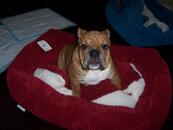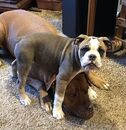Just when you’re sure you have a handle on all the many ways your canine buddy might manage to poison himself, along comes a new one.
[h=2]Australian Shepherd Chews on AA Batteries[/h]
Recently, a one year-old Australian Shepherd was rushed to a veterinary clinic after her owner discovered she’d been sampling, of all things, batteries. The frightened owner discovered two AA alkaline batteries with small punctures in them. He also found a red blotch on the dog’s tongue, and brought her to the clinic.
When the veterinarian examined the Aussie, her responses were normal, and she was bright and alert. The vet did notice a mild abrasion on the left side of the dog’s tongue, but otherwise she appeared fine. She was given medications to protect her GI tract, and her owner was instructed to monitor her at home for worsening mouth lesions, excessive drooling, lethargy, anorexia, or vomiting. The reason for the continued monitoring was because the full extent of internal damage from alkaline battery exposure can take several hours to develop.
About 18 hours after the dog chewed the batteries, she became lethargic, was drooling more than normal, and refused to eat. Her owner brought her back to the clinic, where the vet noted that ulcers had formed on her tongue and inside her mouth. The dog’s temperature was normal and she didn’t seem to be in pain. Blood tests were normal. She was given Tramadol for pain, and an antibiotic.
After about four hours in the hospital, the Aussie began eating small amounts of canned dog food. She was discharged eight hours later, and her owner was instructed to continue her medications until they were finished, and to feed only canned food until the mouth sores were healed. Thankfully, the dog made a full recovery seven days after her AA battery taste test.
[h=2]Why Alkaline Batteries Can Be Toxic[/h]When the veterinarian examined the Aussie, her responses were normal, and she was bright and alert. The vet did notice a mild abrasion on the left side of the dog’s tongue, but otherwise she appeared fine. She was given medications to protect her GI tract, and her owner was instructed to monitor her at home for worsening mouth lesions, excessive drooling, lethargy, anorexia, or vomiting. The reason for the continued monitoring was because the full extent of internal damage from alkaline battery exposure can take several hours to develop.
About 18 hours after the dog chewed the batteries, she became lethargic, was drooling more than normal, and refused to eat. Her owner brought her back to the clinic, where the vet noted that ulcers had formed on her tongue and inside her mouth. The dog’s temperature was normal and she didn’t seem to be in pain. Blood tests were normal. She was given Tramadol for pain, and an antibiotic.
After about four hours in the hospital, the Aussie began eating small amounts of canned dog food. She was discharged eight hours later, and her owner was instructed to continue her medications until they were finished, and to feed only canned food until the mouth sores were healed. Thankfully, the dog made a full recovery seven days after her AA battery taste test.
Dry cell batteries contain alkaline materials that can cause damage when they come in contact with living tissue in a process called liquefaction necrosis. The tissues soften, allowing the alkali to penetrate deeply.
When a dog chews and punctures a battery, the alkaline material can leak out and cause damage to tissues in and around the mouth, and occasionally in the esophagus and farther down the GI tract. Lesions to the esophagus, which is less protected by toxin-diluting secretions than the mouth and stomach, can lead to perforation and/or formation of scars that interfere with its function.
If a dog actually swallows a battery, it can cause an obstruction, and if it stays in the stomach long enough for the casing to dissolve, heavy metals (typically zinc or lead) can be released into the dog’s system, leading to toxicosis.
[h=2]Symptoms of Alkaline Battery Toxicosis[/h]When a dog chews and punctures a battery, the alkaline material can leak out and cause damage to tissues in and around the mouth, and occasionally in the esophagus and farther down the GI tract. Lesions to the esophagus, which is less protected by toxin-diluting secretions than the mouth and stomach, can lead to perforation and/or formation of scars that interfere with its function.
If a dog actually swallows a battery, it can cause an obstruction, and if it stays in the stomach long enough for the casing to dissolve, heavy metals (typically zinc or lead) can be released into the dog’s system, leading to toxicosis.
Symptoms of irritation in and around the mouth can occur within a few hours after a dog chews a battery, followed by ulceration that can take up to 12 hours to fully develop.
Other symptoms include lethargy, excessive salivation, difficulty swallowing, loss of appetite, vomiting (with or without blood), abdominal pain, increased body temperature, and black, tarry feces, which is a sign of bleeding in the upper GI tract. Often, there is also an elevated white blood cell count.
If the battery happens to be a disc or button battery (found in hearing aids, games, watches, calculators, greeting cards, etc.) and is swallowed, there are additional risks to the dog. Not only can alkaline liquid leak from damaged disc batteries, there is also the risk of injury to nearby tissues from the current flowing between the cathode and anode. If the battery lodges in the GI tract and produces corrosive sodium hydroxide, it can result in mucosal burns, necrosis, and perforation.
Obviously, alkaline batteries are another household hazard pet owners should be aware of. Many tech devices we use every day require batteries, and especially this time of year, small batteries are in plentiful supply in most households. If you share your home with a four-legged family member, please take care to insure your furry companion doesn’t have access to alkaline batteries.
Other symptoms include lethargy, excessive salivation, difficulty swallowing, loss of appetite, vomiting (with or without blood), abdominal pain, increased body temperature, and black, tarry feces, which is a sign of bleeding in the upper GI tract. Often, there is also an elevated white blood cell count.
If the battery happens to be a disc or button battery (found in hearing aids, games, watches, calculators, greeting cards, etc.) and is swallowed, there are additional risks to the dog. Not only can alkaline liquid leak from damaged disc batteries, there is also the risk of injury to nearby tissues from the current flowing between the cathode and anode. If the battery lodges in the GI tract and produces corrosive sodium hydroxide, it can result in mucosal burns, necrosis, and perforation.
Obviously, alkaline batteries are another household hazard pet owners should be aware of. Many tech devices we use every day require batteries, and especially this time of year, small batteries are in plentiful supply in most households. If you share your home with a four-legged family member, please take care to insure your furry companion doesn’t have access to alkaline batteries.




